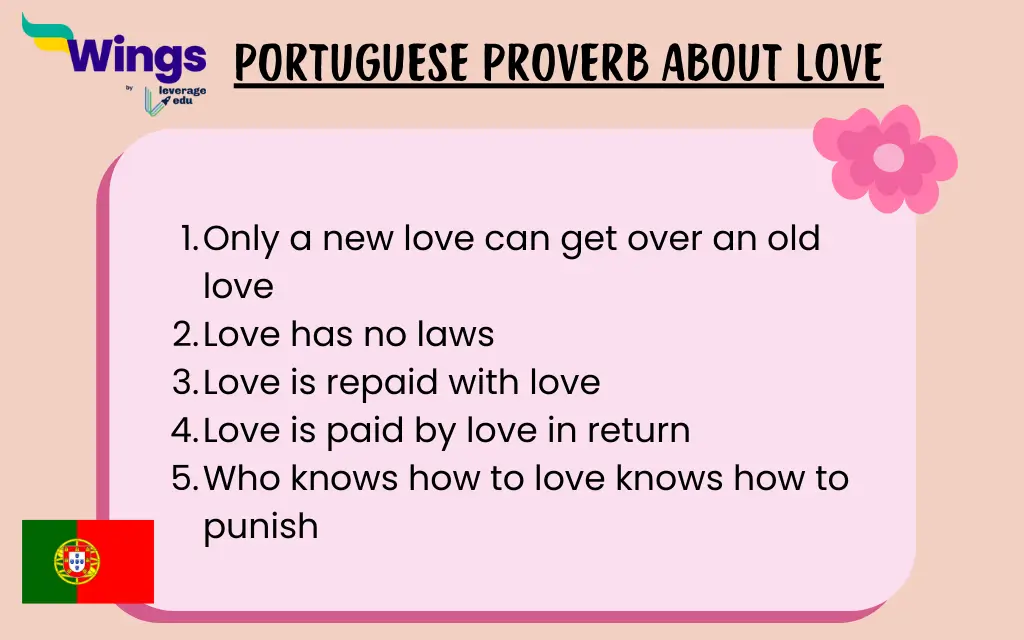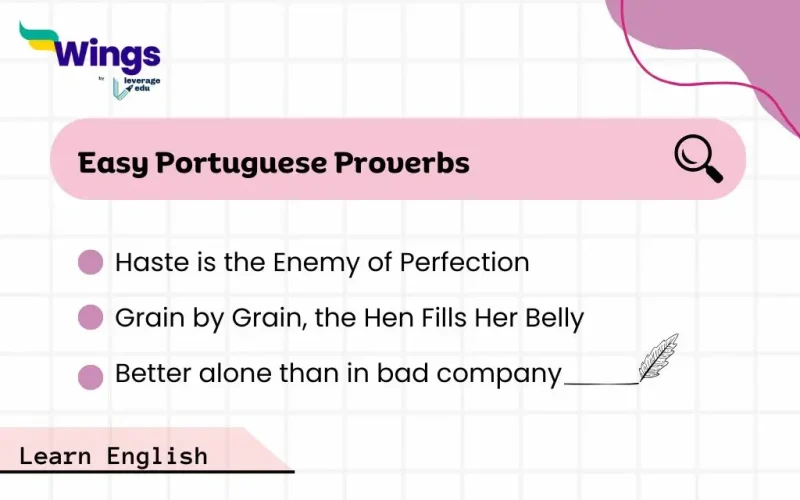Portuguese proverbs are a pathway to the wisdom and culture of Portugal and Brazil. These sayings provide profound insights into human relationships, life, and nature in a simple yet impactful manner. Take, for example, the Portuguese proverb, “For someone wise, half a word suffices.” This means that a perceptive person can understand a situation or message with very little information. In addition, proverbs often use everyday imagery to convey their meanings, hence making them understandable even for beginners. Whether it is advice on love or the importance of patience, each proverb carries a lesson that resonates across cultures. Let’s explore some easy Portuguese proverbs and find their meanings in this blog.
This Blog Includes:
Also Read: 100+ Common Proverbs with Meaning and Examples
5 Great Portuguese Proverbs
Portuguese culture comes from different influences, such as Celtic, Roman, and Moorish, and it affects Portuguese proverbs. Exploring these proverbs improves your understanding of Portuguese traditions and beliefs. Some of them are mentioned below for your reference:
Soft Water, Hard Stone, keeps Beating Until it Gets Through
| Meaning: This proverb teaches us that consistent effort no matter how small or gentle (like soft water) can achieve great results over time even against something seemingly impossible (like a hard stone). |
Haste is the Enemy of Perfection/Hurried eats Raw and Hot
| Meaning: It indicates that when you try to do things too quickly without taking enough time to do them properly, you are more likely to make errors or produce something that isn’t well done. |
Grain by Grain, the Hen Fills Her Belly
| Meaning: It means that even small efforts or contributions, when accumulated over time, can lead to a meaningful result. Moreover, it suggests that persistence and consistency, no matter how small each effort may seem will eventually lead to achieving a larger goal or fulfilling a need. |
Each monkey on its Own Branch
| Meaning: “Each monkey on its own branch” is an idiom that means everyone should mind their own business or focus on their affairs without interfering with others. It suggests that just like monkeys in a tree are content on their branches without disturbing others, people as well should also stay focused on their responsibilities or interests. |
Tell me who You’re With and I’ll Tell You Who You Are
| Meaning: This Proverb suggests that your friends or associates reflect something about your personality and values. Moreover, it indicates that by observing a person’s companions or friends, you can get an idea of their traits and interests. |
Also Read: 11+ Tamil Proverbs With Meanings
Portuguese Proverb About Love
Whether expressing devotion, longing, or the joys of companionship, Portuguese love quotes will speak to your heart. Read on to learn more about these quotes that you can say to your loved ones.

Only a New Love can get over an Old Love
| Meaning: This phrase suggests that the best way to move on from a past relationship is to find a new one. Moreover, it highlights the idea that new experiences and emotions can help heal the wounds left by previous ones. |
Love has No Laws
| Meaning: “Love has No Laws” means that love goes beyond societal boundaries and expectations, thereby recognising no legal or social constraints. |
Love is Repaid with Love
| Meaning: Love is repaid with love suggests that when you show love and kindness to others, you will receive love and kindness in return. |
Love is Paid by Love in Return
| Meaning: This proverb highlights the common nature of love, suggesting that love grows when it is shared and returned. |
Who knows how to Love knows how to Punish
| Meaning: This highlights by saying the complexities of love, meaning that love comes with power and responsibility where deep feelings can lead to both joy and pain. |
Also Read: 11 Common Russian Proverbs in English You Should Know
Easy Portuguese Proverbs With Their Meanings
Portuguese proverbs reflect the values and experiences of Portuguese-speaking communities worldwide. Here are some of the proverbs:
Who Tells a Tale, Increases One Point
| Meaning: “Who Tells a Tale, Increases One Point” is a saying that means when someone tells a story they often add extra details or exaggerate to make it more interesting. In simple words, it means people tend to make their stories sound better or more exciting than they are. |
The Worst Blind is the One Who Doesn’t Want to See
| Meaning: “The worst blind is the one who doesn’t want to see” indicates that the most ignorant person is someone who declines to acknowledge the truth or reality even when it is obvious. |
To love is Eternal Innocence, and the Only absolute Innocence is not to Think.
| Meaning: The phrase “To love is eternal innocence, and the only absolute innocence is not to think” means that genuine love is pure and innocent, untainted by overthinking or doubts. It highlights the idea that love in its purest form is simple and honest much like the innocence of not overthinking things. |
Better Alone than in Bad Company
| Meaning: This phrase means that it’s preferable to be by yourself rather than be with people who might negatively influence you or cause you harm. |
Dog That Barks, Does Not Bite (Or Barking Dogs Seldom Bite)
| Meaning: “A dog that barks does not bite” or “Barking dogs seldom bite” points out that people who make a lot of noise or threats usually do not follow through with action. |
Read more related blogs on Proverbs
FAQs
Basic Portuguese words include greetings like “olá” (hello), “obrigado” (thank you), and essential vocabulary for everyday life such as “sim” (yes), “não” (no), and “por favor” (please).
A well-known Brazilian saying is “Deus é brasileiro,” which translates to “God is Brazilian.” This phrase reflects the strong sense of national pride and faith prevalent in Brazilian culture.
Brazilians commonly say “tchau” to bid farewell, which is a casual and informal way to say goodbye.
This was all about the Easy Portuguese Proverbs for Beginners With Meanings for you. Hopefully, you understood the concept and where it’s used. Moreover, you can also follow the Learn English page of Leverage Edu for more exciting and informative blogs related to grammar.


 One app for all your study abroad needs
One app for all your study abroad needs












 60,000+ students trusted us with their dreams. Take the first step today!
60,000+ students trusted us with their dreams. Take the first step today!